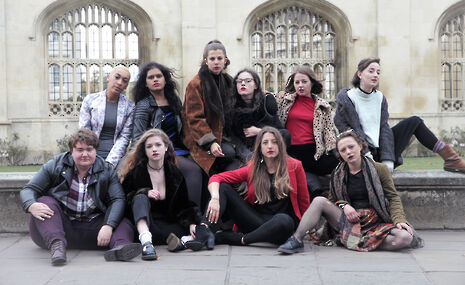Review: The Vagina Monologues
Eva O’Flynn’s sublime adaptation of The Vagina Monologues at the ADC reminds us why we should all be worried about vaginas, writes Galaxy Henry

The electric atmosphere inside the ADC Theatre on the opening night of The Vagina Monologues was certainly enough to dispel concerns that Eve Ensler’s unapologetically crude, yet powerful, play would be too controversial for Cambridge. The eagerly awaiting audience was treated to a series of thought-provoking anecdotes, all documenting the intimate struggles of women in the age-old fight to take back ownership of their bodies and, most importantly, their sexuality.
If, like myself, other members of the audience had been scrutinising the somewhat abstract stage design before the piece began – a sparsely furnished sitting room on stage left, and a study plastered with provocative posters and slogans on stage right – our undivided attention was at once demanded by a direct address from the skilful narrator (Xanthe Burdett). Her compelling gaze and clear voice pierced through the idle chatter of the crowd, inviting us to join her in what soon became an inspiring space in which women from diverse backgrounds could share their stories of abuse, trauma, self-discovery and self-hatred, without fear of judgement.
The warm and encouraging atmosphere of the play was largely facilitated by the apparent camaraderie between the actresses. There were several moments where it was evident that their genuine care for each other had transcended the realms of friendship and permeated the very essence of their performance. What was equally admirable was the passion with which Saskia Ross, in a cacophonous exploration of the female body, urged audience members to reclaim derogatory terms that have been used to demean women for centuries. Spectators were encouraged to unite in solidarity with the characters on stage, which was wholly positive and uplifting.
This was not the end of the audience’s involvement, however. From start to finish, the auditorium resonated with intermittent bursts of ear-splitting laughter, as spectators revelled in the use of ironic humour to dismantle the taboo and awkwardness surrounding the vagina phenomenon. All the actresses gave stellar performances, which did justice to the eloquent poetry of the dialogue. Nevertheless, the original flair brought to the delivery of Katurah Morrish, Emily Mahon, and Sophie Taylor’s monologues was met with some of the loudest applause of the night, and Léa de Garnier des Garet’s sassy re-enactment of, THE WOMAN WHO LOVED TO MAKE VAGINAS HAPPY, was a personal favourite.
Moreover, the pedagogic interludes whereby the narrator provided the audience with facts, figures and a second-hand account of a female refugee’s experience of rape and genital mutilation, enabling the audience to place the play in a wider historical and social context, was one of its most powerful features. The plays discussion of the vagina in regards to lesbian relationships (monologue performed by Sophie Foote) was also very powerful, and one of the few criticisms of this adaptation is that it focuses disproportionately on the experiences of heterosexual women, much to the detriment of other female voices.
On a final note, even though spectators were occasionally plunged into unexplained bouts of darkness, which may or may not have been intended as a metaphor for the darker themes surrounding female sexuality, recognition ought to be given to the swift scene changes, which allowed the plot to unfold seamlessly, and which contributed to the overall unity of the work. Eva O’Flynn et al. have done a superb job in the production of The Vagina Monologues; as is always the case in theatre, the proof is in the viewing, and it made for fantastic viewing
 News / Judge Business School advisor resigns over Epstein and Andrew links18 February 2026
News / Judge Business School advisor resigns over Epstein and Andrew links18 February 2026 News / Hundreds of Cambridge academics demand vote on fate of vet course20 February 2026
News / Hundreds of Cambridge academics demand vote on fate of vet course20 February 2026 News / Petition demands University reverse decision on vegan menu20 February 2026
News / Petition demands University reverse decision on vegan menu20 February 2026 News / CUCA members attend Reform rally in London20 February 2026
News / CUCA members attend Reform rally in London20 February 2026 News / Gov grants £36m to Cambridge supercomputer17 February 2026
News / Gov grants £36m to Cambridge supercomputer17 February 2026









